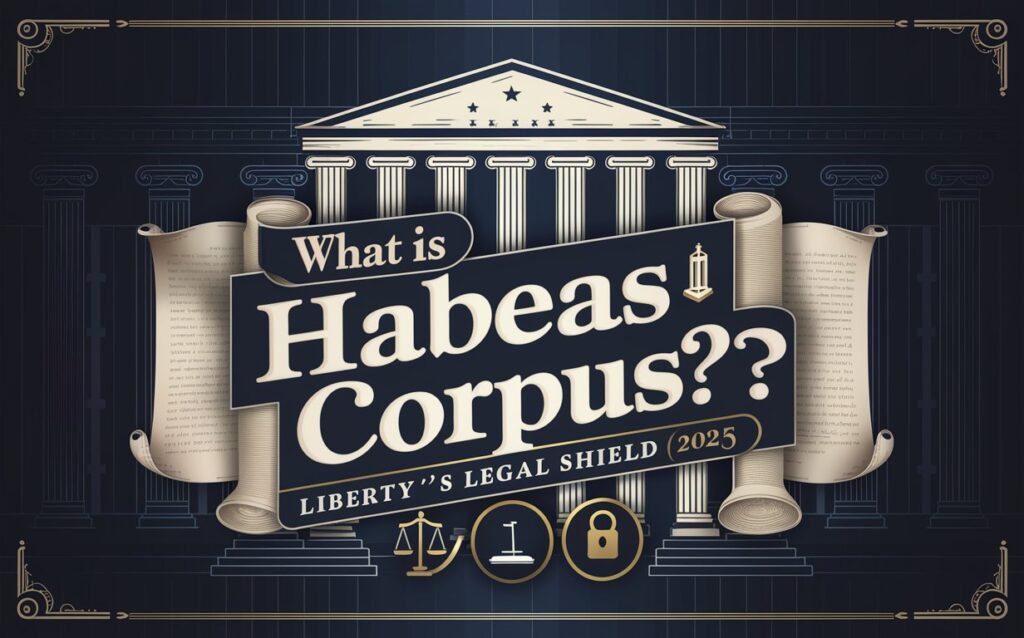⚖️ What Is Habeas Corpus? Understanding the Guardian of Personal Liberty in 2025
Habeas Corpus is one of the most powerful legal protections for individual freedom, ensuring that no one is detained unlawfully. Derived from Latin meaning “you shall have the body,” this ancient legal remedy demands that a person under arrest be brought before a court to determine whether their detention is lawful.
In 2025, Habeas Corpus continues to serve as a critical tool in democratic India, standing strong against arbitrary arrest, political misuse of power, and illegal confinement—even in an age dominated by digital surveillance and preventive detention laws.

🧾 Habeas Corpus in Indian Constitution
The right to file a writ of Habeas Corpus is enshrined in Article 32 and Article 226 of the Indian Constitution. While Article 32 gives citizens the right to directly approach the Supreme Court for enforcement of fundamental rights, Article 226 allows High Courts to intervene in matters of illegal detention.
This legal remedy ensures the judiciary remains a guardian of personal liberty, checking the executive from using authority arbitrarily.
🕊️ When Can You Use Habeas Corpus?
In India, Habeas Corpus can be invoked under several situations:
- Illegal police detention without proper arrest records
- Arrests violating fundamental rights
- Custody beyond 24 hours without magistrate approval
- Political arrests without clear charges
- House arrests under preventive detention laws like NSA 2025
In such cases, the courts can immediately issue notices to the detaining authority and order the person’s physical production before a judge.
🧑⚖️ Famous Habeas Corpus Cases in India
One of the most historic cases is ADM Jabalpur vs Shivkant Shukla (1976) during the Emergency, where the Supreme Court controversially ruled that even Habeas Corpus could be suspended. This was later strongly criticized and reversed in later judgments, restoring its status as a non-negotiable right.
In 2025, courts frequently use this writ to check digital surveillance-led arrests, where citizens are detained for online posts or suspected behavior flagged by AI policing systems.
🛰️ Habeas Corpus in the Age of AI and Surveillance
With India’s rapid use of predictive policing, face recognition, and drone surveillance in 2025, the role of Habeas Corpus has expanded. Legal experts argue that technology must not replace the burden of proof or justify indefinite detention.
For instance, if someone is arrested based on AI-based “behavior analysis” from CCTV data, they can still file a Habeas Corpus writ demanding clear legal grounds and judicial oversight.
🌍 Global Relevance of Habeas Corpus
Habeas Corpus is not unique to India. It exists in nearly all democracies, including the United States, United Kingdom, and Australia. International human rights laws under UN Charter and ICCPR also recognize unlawful detention as a violation of personal freedom.
India’s continued use and judicial strengthening of Habeas Corpus in 2025 reinforces its commitment to both constitutional justice and global democratic standards.
🧩 Conclusion: Habeas Corpus Remains the Last Line of Defense
Habeas Corpus is more than a legal term—it is a lifeline for every citizen. In 2025, as technology tightens the state’s control and detention becomes more discreet, this writ stands taller than ever. It ensures that no matter how powerful a government becomes, personal liberty is not up for compromise.
DoFollow External Links:
Internal Links:



Post Comment